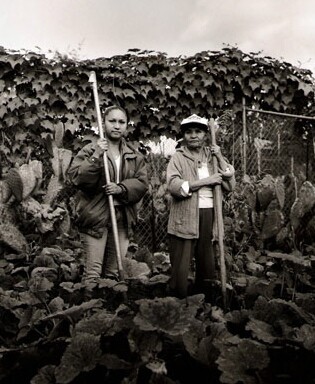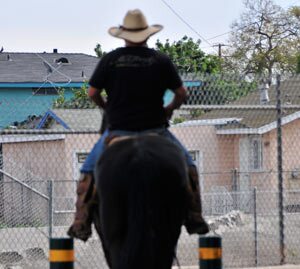Model Urban Agriculture

Several years ago, a group of migrant farmers from Mexico and Central America took over an empty lot in South Central Los Angeles and created a community garden that became a model for urban agriculture. These farmers started out with a basic goal - feed their families as economically as possible using knowledge and practices brought with them from agrarian roots in Central America. In the process of meeting that straightforward goal, though, the South Central Farmers also created a bottom-up, grassroots movement in the heart of Los Angeles that garnered national attention, and also questioned the efficacy - and motives - of the mainstream environmental movement.
Real estate disputes put an to the community garden and in 2006, the farmers where evicted from the land. Like the South Central Farmers, the land and history of Compton's Richland Farms may yet provide a new springboard for community-based environmetal practices. Departures: Richland Farms will take a look at that land and history, and will also look back at the forms of informal urban agriculture practiced by the area's black residents in the 1950's and 60's. We will trace how how those practices were lost and then recovered by Latinos migrating from Central America, and we will also ask whether they provide a model for urban agriculture that can be taken up by future generations.
When Griffith D. Compton donated his land to incorporate and create the city of Compton in 1889, he stipulated that a certain acreage had to be zoned for agricultural purposes only and Richland Farms was born. The large residential lot sizes of Richland Farms provided its residents with enough space to raise a family, have a barn, tend to livestock and grown some food. So it was no surprise that when black families began migrating from the rural South in the 1950's, they found a home away from home in this small community. And although it didn't support large-scale agricultural business, the area did allow residents to work the land for their own use and the good of the community.

This informal practice had largely disappeared by the late 70's and 80's, when being called "rural" or "country" began to strike many black people in Compton as a slur. Younger generations sold land their families had worked for decades, moving away or simply abandoned both farm work and the quest for sustainability. In the 1980's, though, when rural Latinos from Central America began to migrate to Los Angeles in earnest, the same features that had made Compton and Richland Farms attractive to a previous group of migrants made them a draw for a new immigrant population.
Today, Compton's city government, numerous NGO'S and a handful of community residents see the area's ecological potential and are proposing different ways of using the land in order to create urban agricultural models for the city. But, in the way of such things, their efforts often collide.
With the help of community activists such as Mayisha Akbar and with the educational program and expertise of the Environmental Charter School, Departures: Richland Farms will take a look at the ways in which informal the black community practiced urban agriculture in the 1950's and 60's - how it got lost and recovered by Latinos migrating from Central America, and how we can create a model for urban agriculture for future generations.


